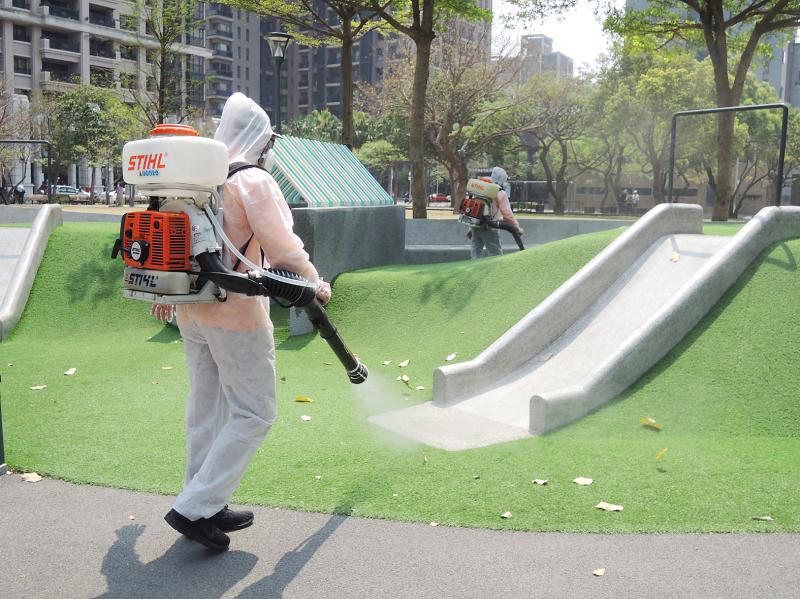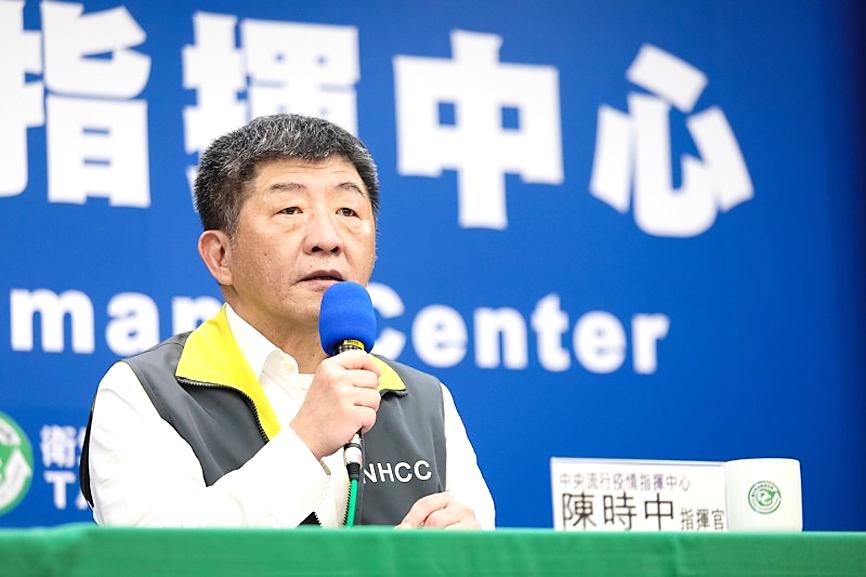The Central Epidemic Command Center (CECC) yesterday recommended that indoor events of more than 100 people and outdoor events with more than 500 people should be canceled, as 19 new imported cases of COVID-19 were announced, bringing the total number in Taiwan to 235.
“The center recommends that from now, indoor events of more than 100 people and outdoor events with more than 500 people should be suspended to reduce the risk of COVID-19 community transmission,” said Deputy Minister of the Interior Chen Tsung-yen (陳宗彥), deputy head of the center.
Event organizers should refer to six indicators listed in the response guidelines for public gatherings, issued by the center on March 5, and evaluate the risks if they are still considering holding public events, he said.

Photo: Hung Mei-hsiu, Taipei Times
The six indicators are: if information about the participants can be obtained beforehand, air ventilation at the event’s venue, the distance between participants, whether venue seating is fixed or mobile, the duration of the event, and whether proper hand hygiene can be implemented and masks can be worn by participants.
“If organizers evaluate an event using the six indicators and consider it as high risk, we suggest that they postpone or cancel the event,” Chen said.
Minister of Health and Welfare Chen Shih-chung (陳時中), head of the center, said that as there are various types of public gatherings, policies have been introduced to gradually reduce them so that people can slowly acclimate to changes in their lifestyles.

Photo courtesy of the Central Epidemic Command Center
“When asked if weddings can still be held, I say: ‘Of course you can get married, because it is only two people,’” Chen Shih-chung said. “However, if you want to hold a large and crowded wedding ceremony, then we do not recommend it [at this time].”
Only “soft” policies advising people to take extra precautionary measures have been implemented, in preparation for the possibility that the COVID-19 situation worsens and “hard” policies have to be enacted, he said.
Chen Tsung-yen said 101 nightclubs, bars and karaoke clubs nationwide have been temporarily closed. Ninety-one did so voluntarily and 10 were ordered by the Taichung City Government to shut.
Chen Shih-chung said that 19 imported cases of COVID-19 were confirmed yesterday, seven men and 12 women who have all recently returned from abroad, most of whom (18) are aged 10 to 40.
Four of the new cases are part of a cluster of students from the same school in the UK who returned to Taiwan together on Sunday; one was a member of a group tour to Egypt, of which nine members and the child of one member have been infected; and another case is a woman who studied in the UK and returned on Saturday last week with a previously confirmed case, he said.
Seven of the new cases were tested at airports upon arriving in Taiwan, 10 were tested while in home quarantine, one while in home isolation and one tested positive after seeking medical treatment, he added.
“Nine of the new cases had returned from the UK and six from the US,” Chen Shih-chung said, adding that the large number of confirmed cases from Britain was due to the two clusters.
Deputy Minister of Health and Welfare Hsueh Jui-yuan (薛瑞元) said that as a nurse at a long-term care center on Saturday tested positive for the coronavirus, the center has revised regulations for disease prevention and control at healthcare and long-term care facilities.
“The center’s specialists decided to expand testing criteria to include medical professionals and workers at long-term care facilities. If they experience a fever or respiratory symptoms and a physician suspects a COVID-19 infection, they can be tested for the coronavirus,” he said.
“They would be allowed to return to work after they test negative twice [at least 24 hours apart], do not have a fever for 24 hours and if a physician certifies that their respiratory symptoms have abated,” Hsueh said, adding that such people would not be placed in 14-day home quarantine to prevent a shortage of medical personnel and caregivers.
However, the occupation of medical professionals and long-term care facility workers would be marked in the National Health Insurance database so that attending physicians are more cautious and consider the expanded testing criteria, he said.
Affected personnel include medical professionals and social workers at hospitals; nursing assistants, workers and residents of long-term care facilities, nursing homes and veterans’ homes; and workers at children and youth welfare institutes, and post-partum care centers.
Facilities would also be required to establish regulations on prohibiting visitors; mandating self-health monitoring by workers and residents; asking workers with respiratory symptoms to take sick leave; and banning employees from working if they have a temperature of at least 38°C measured by an ear thermometer, Hsueh said.

Right-wing political scientist Laura Fernandez on Sunday won Costa Rica’s presidential election by a landslide, after promising to crack down on rising violence linked to the cocaine trade. Fernandez’s nearest rival, economist Alvaro Ramos, conceded defeat as results showed the ruling party far exceeding the threshold of 40 percent needed to avoid a runoff. With 94 percent of polling stations counted, the political heir of outgoing Costa Rican President Rodrigo Chaves had captured 48.3 percent of the vote compared with Ramos’ 33.4 percent, the Supreme Electoral Tribunal said. As soon as the first results were announced, members of Fernandez’s Sovereign People’s Party

EMERGING FIELDS: The Chinese president said that the two countries would explore cooperation in green technology, the digital economy and artificial intelligence Chinese President Xi Jinping (習近平) yesterday called for an “equal and orderly multipolar world” in the face of “unilateral bullying,” in an apparent jab at the US. Xi was speaking during talks in Beijing with Uruguayan President Yamandu Orsi, the first South American leader to visit China since US special forces captured then-Venezuelan president Nicolas Maduro last month — an operation that Beijing condemned as a violation of sovereignty. Orsi follows a slew of leaders to have visited China seeking to boost ties with the world’s second-largest economy to hedge against US President Donald Trump’s increasingly unpredictable administration. “The international situation is fraught

MORE RESPONSIBILITY: Draftees would be expected to fight alongside professional soldiers, likely requiring the transformation of some training brigades into combat units The armed forces are to start incorporating new conscripts into combined arms brigades this year to enhance combat readiness, the Executive Yuan’s latest policy report said. The new policy would affect Taiwanese men entering the military for their compulsory service, which was extended to one year under reforms by then-president Tsai Ing-wen (蔡英文) in 2022. The conscripts would be trained to operate machine guns, uncrewed aerial vehicles, anti-tank guided missile launchers and Stinger air defense systems, the report said, adding that the basic training would be lengthened to eight weeks. After basic training, conscripts would be sorted into infantry battalions that would take

GROWING AMBITIONS: The scale and tempo of the operations show that the Strait has become the core theater for China to expand its security interests, the report said Chinese military aircraft incursions around Taiwan have surged nearly 15-fold over the past five years, according to a report released yesterday by the Democratic Progressive Party’s (DPP) Department of China Affairs. Sorties in the Taiwan Strait were previously irregular, totaling 380 in 2020, but have since evolved into routine operations, the report showed. “This demonstrates that the Taiwan Strait has become both the starting point and testing ground for Beijing’s expansionist ambitions,” it said. Driven by military expansionism, China is systematically pursuing actions aimed at altering the regional “status quo,” the department said, adding that Taiwan represents the most critical link in China’s